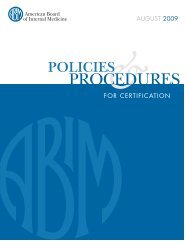The SRA Symposium - College of Medicine
The SRA Symposium - College of Medicine
The SRA Symposium - College of Medicine
You also want an ePaper? Increase the reach of your titles
YUMPU automatically turns print PDFs into web optimized ePapers that Google loves.
Papers<br />
Questions that can be discussed in the planning session are:<br />
1. What development activities are currently in place by Research and Sponsored Programs Offices?<br />
2. Can your <strong>of</strong>fice expand these services using current personnel?<br />
3. What new projects do you anticipate the administration <strong>of</strong> your institution will ask Research<br />
and Sponsored Programs to create or develop in the next five years?<br />
4. Are there demands by state government, regional entities or the community for your institution<br />
to meet needs for employment, training or creating centers in the next five years? If so,<br />
what will be the demands on Research and Sponsored Programs to provide services for the<br />
creation and administration <strong>of</strong> these collaborative efforts?<br />
5. Will Research and Sponsored Programs need to have additional funding or personnel to create<br />
or administer these new programs?<br />
6. Will administration in your organization be supportive <strong>of</strong> providing the additional resources<br />
for development?<br />
<strong>The</strong> planning session that discusses these issues may come up with ideas on how to provide more<br />
outreach to faculty and staff in writing competitive grant proposals without having to add more<br />
personnel for the <strong>of</strong>fice. External demands may be identified as the need to work more closely with<br />
the community to develop business incubators, creation <strong>of</strong> jobs and research parks. <strong>The</strong>se activities<br />
will mean that there will be a need for more additional personnel and perhaps the creation <strong>of</strong><br />
new departments in the Research and Sponsored Programs Office.<br />
Challenges for higher education will continue to grow in the twenty-first century and it will be<br />
essential for Research and Sponsored Programs Offices to work with their internal and external<br />
clients for developing innovative programs and strategies.<br />
References<br />
Cholo, Anna B. (May 9, 2005). City’s <strong>College</strong>-Bound Rate a Third Less than Thought, Chicago<br />
Tribune, A1 & 9.<br />
Heber, S., (2004). State Spending on Higher Education Up Slightly, a Reversal from Previous Year.<br />
<strong>The</strong> Chronicle <strong>of</strong> Higher Education. Volume Number. Pages.<br />
Illinois Board <strong>of</strong> Higher Education, (2005). Fiscal Year 2006 Higher Education Cooperation Act<br />
(HECA) Requests for Proposals (RFP) for New and Renewal Applications.<br />
Selingo, J., (2005). To Recruit Today’s Students, <strong>College</strong> Must be Agile Marketers, Officials are<br />
Told. <strong>The</strong> Chronicle <strong>of</strong> Higher Education, Volume 50. Pages.<br />
Special Report (July 21, 2005). Manna or Pork: Members <strong>of</strong> Congress earmarked more than<br />
$2- billion for charities this year, a Chronicle study finds. <strong>The</strong> Chronicle <strong>of</strong> Higher Education,<br />
Volume 27, Number 19, A6.<br />
Wake Forest University (2005). A Report on Research Activities at U.S. Research Universities, 1-8.<br />
160 2005 <strong>Symposium</strong> Proceedings Book

















